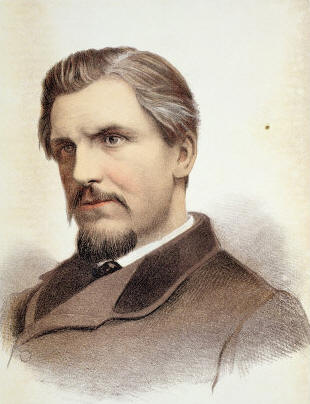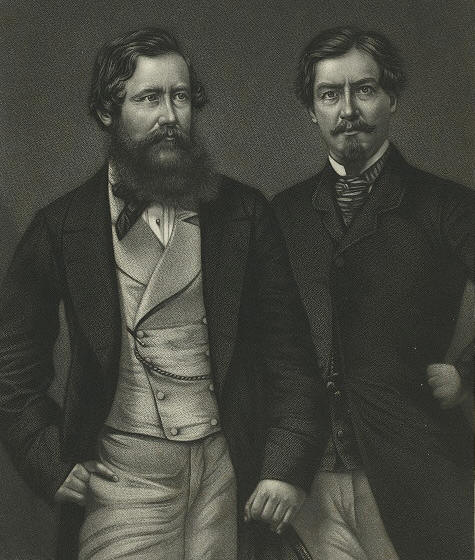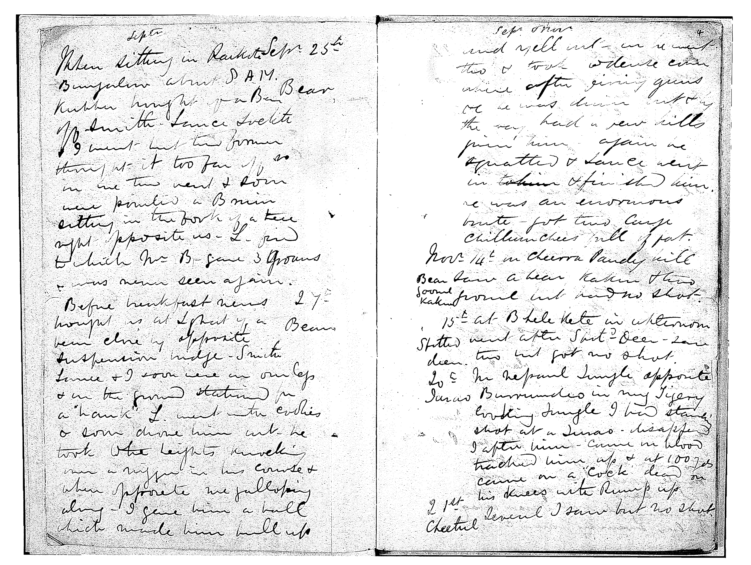 Grant,
James Augustus 1827-1892 [burtoniana.org]
Grant,
James Augustus 1827-1892 [burtoniana.org] Grant,
James Augustus 1827-1892 [burtoniana.org]
Grant,
James Augustus 1827-1892 [burtoniana.org][DNB: WILLIAM CARR, 1901]
Place of Birth: Nairn
Education: Nairn, Aberdeen grammar schools, Marischal College, Aberdeen
Death: House hill, Nairn, North Britain
Spouse: Margaret, daughter of Andrew Laurie
Grant, James Augustus 1827-1892, lieutenant-colonel, African traveller, born at Nairn on 11 April 1827, was the fourth and youngest son of James Grant, minister of Nairn, by his wife Christian, daughter of John Mackintosh. He was educated first at the Nairn and Aberdeen grammar schools, and subsequently at the Marischal College, Aberdeen. There he attended classes in chemistry, mathematics, natural history, and botany, all subjects which afterwards in his travels stood him in good stead. He was granted a commission in the 8th native Bengal infantry on 8 June 1846, and was present at both sieges of Multan and at the battle of Gujerat. In 1853 he was appointed adjutant, and acted as such until the mutiny of his regiment in 1857. He was attached to the 78th highlanders at the relief of Lucknow, and was wounded when in command of two companies of the same, forming part of the rearguard of the army. On 23 Oct. 1858 he returned to England on sick certificate.
Grant's acquaintance with John Hanning Speke [q.v.] dated from 1847; both
were in the same service, about the same age, and ardently devoted to field
sports, especially the hunting of big game. When Speke, after his first journey,
was commissioned by the Royal Geographical Society to prosecute his discoveries,
Grant offered to accompany him, and the offer was immediately accepted. The
conduct of the expedition was under the direction of Speke, and on all occasions
Grant proved himself a loyal and devoted follower, ‘not a shade of jealousy or
distrust or even ill temper ever coming between them on their wanderings’
(Preface to GRANT'S Walk across Africa, p. ix). Though acting under his chief's
instructions, he was for long periods in the journey in independent command of a
portion of the expedition. He remained at the village of Ukuni from 27 May to 21
Sept. 1861, with the bulk of the baggage, stationary for want of porters, while
Speke, with the other portion of the caravan, was vainly struggling to secure
effective assistance. The difficulty with regard to porters being at last
overcome, they again joined forces on 26 Sept., and marched north between
Tanganyika and the Victoria Nyanza, and proceeded through Bogue in company to
Karagué, 1° 40¢ S. equator, where they arrived in November 1861. Here Grant
remained till 14 April 1862. He was prevented by sickness from accompanying
Speke, when the road to Uganda was opened to the latter on 12 Jan. 1862, and
shortly afterwards became absolutely unable to move with a dangerously inflamed
leg. While thus helpless he was kindly treated by Rumanika, the king of Karagué,
and though obliged to submit his limb to the cures of the native physician, he
found himself sufficiently recovered on 14 April 1862 to set out to join Speke
in Uganda. He arrived, after a toilsome journey undertaken for the most part in
a litter because of his lameness, at Mtesa's capital on 27 May 1862, where Speke
was living in favour with the king. From Uganda the travellers started together
on 7 July for Unyoro, but separated again on 19 July, when Grant was despatched
with the bulk of the baggage to Chagasi, King Kamrasi's capital, while Speke
left with a small party to find the exact point where the Nile emerges from the
Victoria Nyanza. The suggestion that Speke did not wish to share with another
the discovery of the exact point of emergence is quite unfounded. Grant was
asked to accompany him, and afterwards declared that ‘his own state of health
alone prevented him from accompanying Speke’ (Walk across Africa, p. 247).
 Great
difficulty was experienced in approaching Chagasi, owing to the unwillingness of
the king to receive the party, and Grant was obliged to retire towards Uganda,
when by a fortunate accident he came across Speke's party on 19 Aug. 1862. The
explorers now overcame the reluctance of the king, and arrived at the capital of
Unyoro, latitude 1° 37¢ N., longitude 32° 19¢ E., on 9 Sept., where they
remained till 9 Nov., and then proceeded partly by land, partly by water, to the
falls of Karuma. They arrived at De Bono's station at Faloro on 3 Dec., and were
met and assisted at Gondokoro by (Sir) Samuel Baker [q.v.].
Great
difficulty was experienced in approaching Chagasi, owing to the unwillingness of
the king to receive the party, and Grant was obliged to retire towards Uganda,
when by a fortunate accident he came across Speke's party on 19 Aug. 1862. The
explorers now overcame the reluctance of the king, and arrived at the capital of
Unyoro, latitude 1° 37¢ N., longitude 32° 19¢ E., on 9 Sept., where they
remained till 9 Nov., and then proceeded partly by land, partly by water, to the
falls of Karuma. They arrived at De Bono's station at Faloro on 3 Dec., and were
met and assisted at Gondokoro by (Sir) Samuel Baker [q.v.].
During the journey Grant had kept careful meteorological registers, and had made elaborate botanical notes; these and his drawings were unreservedly handed over to his friend, and made use of in Speke's printed account of the expedition. At first no separate publication on Grant's part was meditated, and it was only at the suggestion of Speke and others of his friends that he undertook to publish portions of his journal. His book appeared in December 1864, and the title ‘A Walk across Africa’ was suggested by Lord Palmerston's genial remark to the author, ‘You have had a long walk, Captain Grant’ (Preface to Walk across Africa, p. x). The work was founded on his journal, and dwelt rather on the customs and habits of the native tribes than the geographical events of the expedition; it was interspersed with personal anecdotes, and was dedicated to the memory of Speke. The gold medal of the Royal Geographical Society and medals from Pope Pius IX and King Victor Emanuel were awarded to Grant in 1864, and in September 1866 he was granted the order of C.B. for his services in the discovery of the source of the Nile. In 1868 he served in the intelligence department with the Abyssinian expedition under Lord Napier, and after the war received the companionship of the order of the Star of India. He retired from the service with the rank of lieutenant-colonel on 7 May 1868. Grant now spent the greater part of his time at House hill, Nairn, North Britain, where he died on 11 Feb. 1892.
He married on 25 July 1865 Margaret, daughter of Andrew Laurie, by whom he left two sons and three daughters. His eldest son was also attracted to African travel, and accompanied Joseph Thomson [q.v.] in his exploration of Lake Bangweolo, to the west of Lake Nyassa, and reached and mapped the head waters of the Congo and Zambesi. The younger son, when acting as a lieutenant in Lord Roberts's horse, died from wounds received on 11 Feb. 1900, in one of the engagements in the great Boer war during the advance towards the relief of Kimberley. In appearance Grant was of remarkably fine physique, six feet two inches in height, and broad in proportion. He was possessed of great strength and power of endurance. Sir Samuel Baker described him as ‘one of the most loyal, charming characters in the world, perfectly unselfish, and always ready to give to his companion in travel all the honour for the expedition’ (Memoir of Sir S. Baker, p. 98). He perhaps too readily admitted that he would have been unable to carry through the object of the journey unaided (ib.), and from extreme modesty underestimated the value of his own services. The peculiar qualification which he possessed for winning the friendship of the natives was no less necessary to the success of the expedition than the spirit of leadership with which Speke was so richly endowed. A portrait of Grant by Watts passed into the possession of Mrs. Grant, also a bust in marble by Davidson. A brass, with an inscription to his memory, is in the crypt of St. Paul's Cathedral.
He wrote a summary of the Speke and Grant expedition for the ‘Journal of the Royal Geographical Society,’ 1872, and contributed the matter for the twenty-ninth volume of the Linnean Society's publication entitled ‘Botany of the Speke and Grant Expedition.’ He also wrote in the ‘Journal of the Geographical Society’ for 1876 a paper on (Sir) H. M. Stanley's ‘Exploration of the Victoria Nyanza.’ His collections of dried plants are now in the Kew herbarium, and his manuscript journal passed to his widow, Mrs. Grant, of House hill, Nairn.
Sources
Times, 12 Feb. 1892; Grant's works; Journal of Royal Geographical Soc. 1892; Men and Women of the Time; information derived from family sources.

Leaves from Grant's Journal.